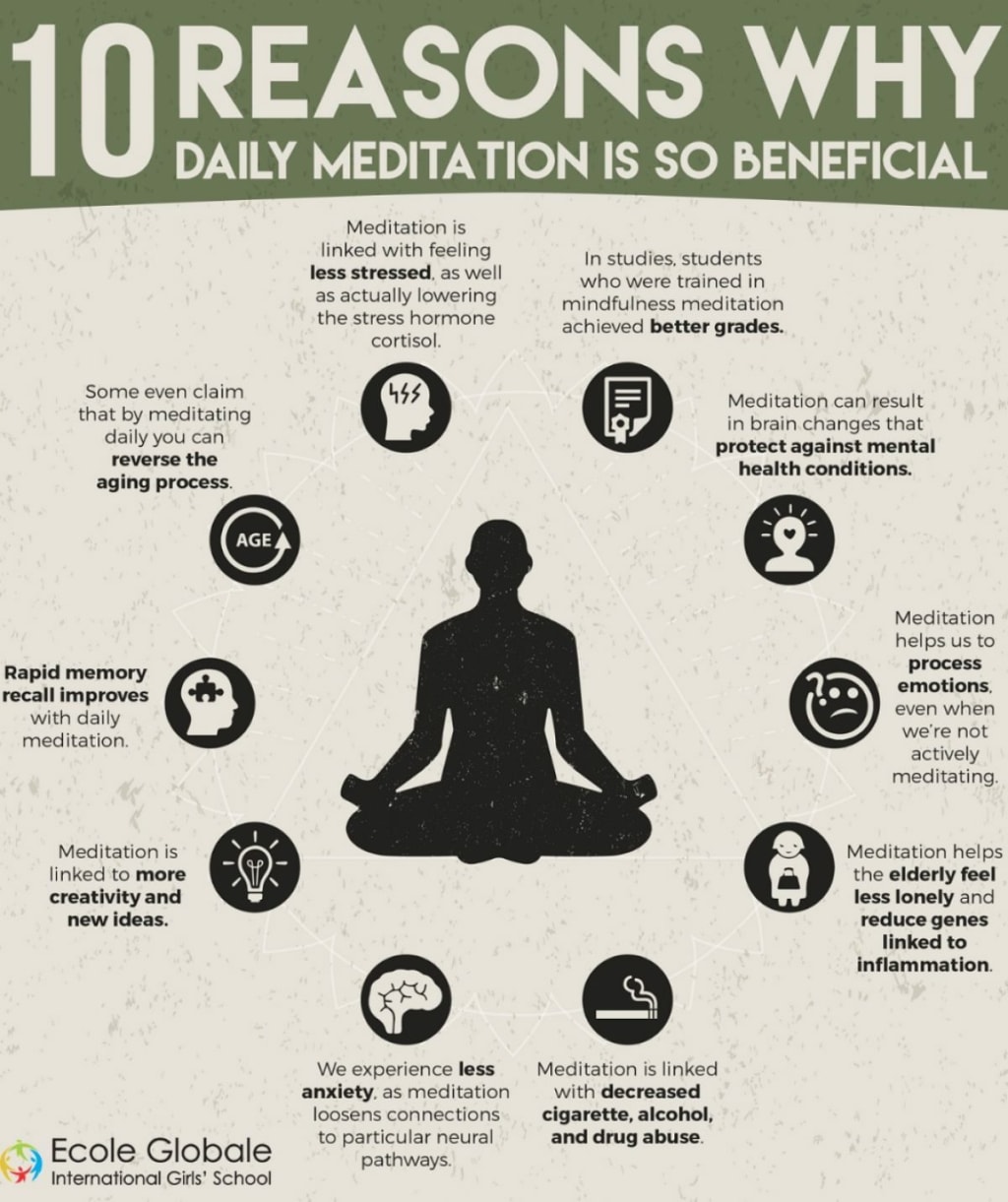The Top 10 Health Benefits of Meditation: What Science Says
Meditation is an ancient practice that has been gaining popularity in recent years. It involves focusing your attention on a particular object, thought, or activity to achieve mental clarity, relaxation, and a sense of inner peace. There is growing evidence that meditation can provide many health benefits, ranging from reduced stress and anxiety to improved cardiovascular health and better immune function. In this article, we will explore the top 10 health benefits of meditation, as supported by science.

Table of Contents
1.Introduction
2.Stress Reduction
3.Anxiety Relief
4.Improved Sleep
5.Enhanced Emotional Well-being
6.Lower Blood Pressure
7.Better Focus and Concentration
8.Increased Immunity
9.Pain Management
10.Anti-aging Benefits
11.Conclusion
12.FAQs
1. Introduction
Meditation is a practice that has been around for thousands of years, but it is only in recent decades that science has begun to study its potential health benefits. While there are many different types of meditation, they all involve some form of mindfulness or focused attention. The benefits of meditation are numerous, and they extend beyond just feeling calm and centered. In the following sections, we will explore the top 10 health benefits of meditation, backed by scientific research.
2. Stress Reduction
One of the most well-known benefits of meditation is its ability to reduce stress. Studies have shown that regular meditation practice can lower cortisol, a stress hormone that can lead to a host of health problems, including anxiety, depression, and heart disease. Meditation has also been shown to reduce symptoms of post-traumatic stress disorder (PTSD) and improve overall well-being in people experiencing chronic stress.
3. Anxiety Relief
Anxiety is a common mental health condition that affects millions of people worldwide. Meditation has been shown to be an effective tool for reducing anxiety and related symptoms, such as panic attacks and social anxiety disorder. In fact, a review of 47 studies found that meditation was associated with reduced symptoms of anxiety and depression.
4. Improved Sleep
Many people struggle with sleep disorders, such as insomnia or sleep apnea. Meditation has been shown to be a helpful tool for improving sleep quality and duration. One study found that a mindfulness-based intervention improved sleep quality in older adults with moderate sleep disturbances.
5. Enhanced Emotional Well-being
Meditation can also help to enhance emotional well-being by promoting feelings of happiness, compassion, and empathy. In one study, participants who completed a mindfulness-based stress reduction program reported improvements in their emotional well-being and quality of life.
6. Lower Blood Pressure
High blood pressure is a significant risk factor for heart disease and stroke. Meditation has been shown to be an effective tool for lowering blood pressure, even in people with hypertension. One study found that participants who practiced transcendental meditation for three months experienced significant reductions in both systolic and diastolic blood pressure.
7. Better Focus and Concentration
Meditation can also improve focus and concentration, which can be helpful for people who struggle with attention deficit hyperactivity disorder (ADHD) or other attention disorders. One study found that mindfulness meditation improved cognitive control and working memory in adults with ADHD.
8. Increased Immunity
Meditation has been shown to boost the immune system, which can help to prevent illness and disease. One study found that participants who practiced mindfulness meditation had higher levels of antibodies in their blood, indicating a stronger immune response to a flu vaccine.
9. Pain Management
Meditation can also be an effective tool for managing chronic pain. Studies have shown that mindfulness-based interventions can reduce pain intensity and improve quality of life in people.
9. Pain Management (Continued)
with chronic pain conditions such as fibromyalgia, lower back pain, and arthritis. Meditation can also reduce the emotional distress associated with chronic pain, such as anxiety and depression.
10. Anti-aging Benefits
Finally, meditation may have anti-aging benefits. A study conducted on a group of long-term meditators found that they had longer telomeres than non-meditators. Telomeres are the protective caps on the end of our DNA strands that naturally shorten with age, so having longer telomeres is associated with increased longevity and a lower risk of age-related diseases.
11. Conclusion
In conclusion, the science supports the many health benefits of meditation, from reducing stress and anxiety to improving cardiovascular health and boosting the immune system. Whether you are new to meditation or a long-time practitioner, incorporating this practice into your daily routine can lead to improved physical, mental, and emotional well-being.
12. FAQs
Is meditation a religious practice?
Meditation has its roots in many spiritual traditions, but it can also be practiced secularly as a tool for health and well-being.
How long do I need to meditate to see benefits?
Research suggests that even a few minutes of daily meditation can provide benefits, but most studies use a minimum of 10-15 minutes per day.
Can meditation help with addiction?
Meditation has been shown to be a helpful tool for reducing addictive behaviors, such as smoking or substance abuse.
Is there a "right" way to meditate?
There is no one "right" way to meditate. Different techniques work for different people, so it's important to find what works best for you.
Can meditation be harmful?
While meditation is generally safe for most people, some individuals may experience negative effects such as increased anxiety or depression. It's important to speak with a healthcare provider if you have concerns about beginning a meditation practice.
About the Creator
ADITYA SALVE
My Name is Aditya Salve, and I am a beginner graphic designer with a growing interest in content writing. I have completed my training in Adobe Photoshop and After Effects, and I am currently learning 3ds Max to expand my skill






Comments
There are no comments for this story
Be the first to respond and start the conversation.